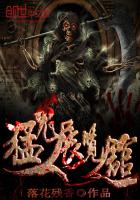"That was the man, young lady. Grant was a doctor, and the Mexicans wanted doctors. They offered him his life for his services, but he would not have it unless his friend's life also was spared. They were shot holding each other's hands, and fell together. I was watching their faces at the moment.
There wasn't a bit of fear in them."
The Senora rose, and came as swiftly as a spirit to them. She looked like a woman walking in her sleep. She touched the stranger. "I heard you. You saw Dare Grant die. But my boy!
My boy! Where is my Juan?"
"Maria, darling."
"Don't speak, Roberto. Where is my Juan? Juan Worth?"
"Madam. I am sorry enough, God knows. Juan Worth--was shot."
Then the wretched mother threw up her hands, and with an awful cry fell to the ground. It was hours ere she recovered consciousness, and consciousness only restored her to misery.
The distress of the father, the brother and sisters of the dead youth was submerged in the speechless despair of the mother. She could not swallow food; she turned away from the the{sic} sympathy of all who loved her. Even Isabel's caresses were received with an apathy which was terrifying.
With the severed curl of her boy's hair in her fingers, she sat in tearless, voiceless anguish.
Poor Antonia, weighed down with the double loss that had come to her, felt, for the first time, as if their condition was utterly hopeless. The mental picture of her brother and her lover meeting their tragic death hand in hand, their youth and beauty, their courage and fidelity, was constantly before her.
With all the purity and strength of her true heart, she loved Dare; but she did not for a moment wish that he had taken a different course. "It is just what I should have expected from him," she said to Isabel. "If he had let poor Jack die alone, I could never have loved him in the same way again. But oh, Isabel, how miserable I am?"
"Sweet Antonia, I can only weep with you. Think of this; it was on last Sunday morning. Do you remember how sad you were?"
"I was in what seemed to be an unreasonable distress. I went away to weep. My very thoughts were tired with their sorrowful journeys up and down my mind, trying to find out hope and only meeting despair. Oh, my brave Jack! Oh, my dear Dare, what a cruel fate was your's!"
"And mi madre, Antonia? I fear, indeed, that she will lose her senses. She will not speak to Thomas, nor even to me.
She has not said a prayer since Jack's death. She cannot sleep. I am afraid of her, Antonia."
"To-night we are to move further east; perhaps the journey may waken her out of this trance of grief. I can see that our father is wretched about her; and Thomas wanders in and out of the room as if his heart was broken."
"Thomas loved Jack. Luis told me that he sat with him and Lopez, and that he sobbed like a woman. But, also, he means a great revenge. None of the men slept last night. They stood by the camp-fires talking. Sometimes I went to the door and looked out. How awful they were in the blaze and darkness! I think, indeed, they could have conquered Santa Anna very easily."
Isabel had not misjudged the spirit of the camp. The news of the massacre at Goliad was answered by a call for vengeance that nothing but vengeance could satisfy. On the following day Houston addressed his little army. He reminded them that they were the children of the heroes who fought for liberty at Yorktown, and Saratoga, and Bunker Hill. He made a soul-stirring review of the events that had passed; he explained to them their situation, and the designs of the enemy, and how he proposed to meet them.
His voice, loud as a trumpet with a silver sound, inspired all who heard it with courage. His large, bright visage, serious but hopeful, seemed to sun the camp. "They live too long," he cried, "who outlive *******. And I promise you that you shall have a full cup of vengeance. For every man that fell fighting at the Alamo, for every one treacherously slaughtered at Goliad, you shall be satisfied. If I seem to be flying before the enemy now, it is for his destruction.
Three Mexican armies united, we cannot fight. We can fight them singly. And every mile we make them follow us weakens them, separates them, confuses them. The low lands of the Brazos, the unfordable streams, the morasses, the pathless woods, are in league with us. And we must place our women and children in safety. Even if we have to carry them to General Gaines and the United States troops, we must protect them, first of all. I believe that we shall win our ******* with our own hands; but if the worst come, and we have to fall back to the Sabine, we shall find friends and backers there. I know President Jackson, my old general, the unconquered Christian Mars! Do you think he will desert his countrymen?
Never! If we should need help, he has provided it. And the ******* of Texas is sure and certain. It is at hand. Prepare to achieve it. We shall take up our march eastward in three hours."
Ringing shouts answered the summons. The camp was in a tumult of preparation immediately; Houston was lending his great physical strength to the mechanical difficulties to be encountered. A crowd of men was around. Suddenly a woman touched him on the arm, and he straightened himself and looked at her.
"You will kill Santa Anna, General? You will kill this fiend who has escaped from hell! By the mother of Christ, I ask it."
"My dear madam!"
He was so moved with pity that he could not for a moment or two give her any stronger assurance. For this suppliant, pallid and frenzied with sorrow, was the once beautiful Senora Worth. He looked at her hollow eyes, and shrunk form, and worn clothing, and remembered with a pang, the lovely, gracious lady clad in satin and lace, with a jewelled comb in her fine hair and a jewelled fan in her beautiful hands, and a wave of pity and anger passed like a flame over his face.
"By the memory of my own dear mother, Senora, I will make Santa Anna pay the full price of his cruelties."
"Thank you, Senor"; and she glided away with her tearless eyes fixed upon the curl of black hair in her open palm.













